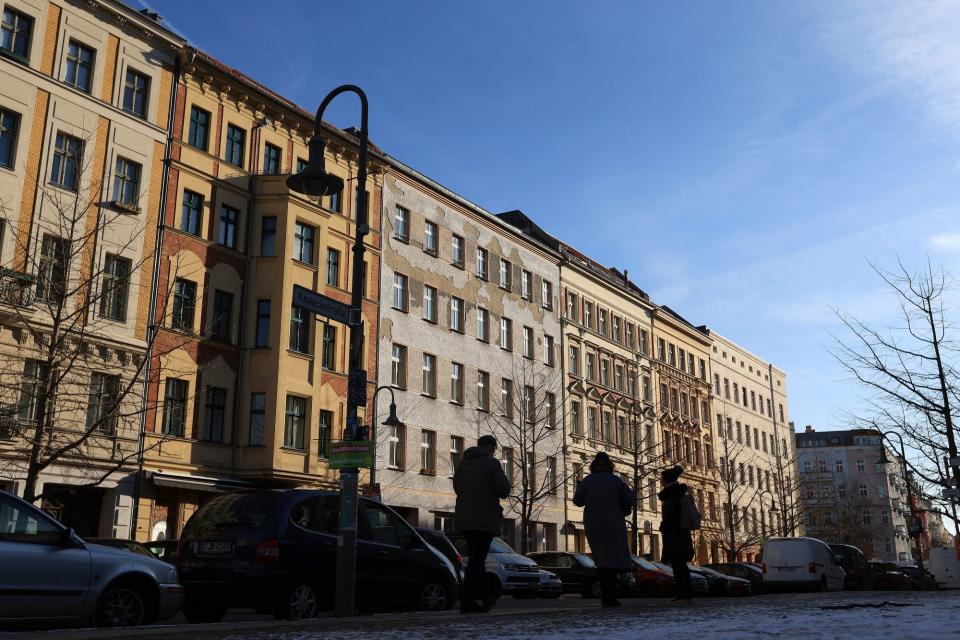Berlin’s Barren Housing Market Is Putting Its Tech Boom at Risk
(Bloomberg) -- Berlin’s new tech recruits are being told to take any apartment they can get, even if it’s nowhere close to the trendy neighborhoods that may have lured them to the German capital.
Most Read from Bloomberg
China Says US Balloons Trespassed Over 10 Times Since Early 2022
US Fighter Jet Downs Fourth Aerial Object Over North America
The city’s housing crunch means startups in Berlin have lost an important edge, putting them on similar footing to rivals in London, Paris and Silicon Valley. That’s a challenge for a city that grew to become Europe’s third-largest tech hub in no small part because of its more affordable lifestyle.
Rather than landing an apartment in a few weeks, Berlin newbies are stuck for months in temporary housing, others are forced into commutes of more than an hour, and some even give up and go home. While rising rents are a problem for most residents, the main issue for Berlin’s tech sector is a lack of supply, which means higher salaries offer little respite.
Click here for a German version: Von ‘arm, aber sexy’ zu ‘teuer, oder vergeben’
“For the tech community, the issue is availability,” said Johannes Reck, chief executive officer of Berlin-based travel startup GetYourGuide AG. “We just don’t have enough housing.”
That makes for a sticky problem, not just for companies competing for talent across the globe but for Berlin itself. In little over a decade, the city went from easygoing to inaccessible. If well-paid tech workers are struggling, the prospects are even bleaker for the average Berliner, and that’s having political fallout.
A vote on Sunday — forced by court order after a chaotic election process in September 2021 — could topple the Social Democratic incumbent, Franziska Giffey. Recent polls show the Christian Democrats ahead by as much as 6 points, and if the conservative party does secure control of the capital’s government for the first time in two decades, it would be a blow for Chancellor Olaf Scholz’s party. Failed housing policy would play a big role.
Giffey’s coalition didn’t achieve targets of building 20,000 new homes a year, and the apartments that are being built aren’t easing the price surge. Newly built units are offered for about €22 per square meter, well above the city’s average, according to Guthmann Estate.
The 44-year-old mayor also ignored the results of a referendum that called for the city government to buy out large landlords to increase the stock of public housing.
“Giffey said she couldn’t reconcile expropriation with her conscience, but implementing this referendum is a democratic mandate,” said Karla Hildebrandt of Deutsche Wohnen Enteignen, the campaign group that organized the referendum. The CDU’s building-focused plan wouldn’t lower rents, she added.
Housing policy plays an outsized role in Berlin because 75% of residents live in rented accommodation. That’s spawned robust rent controls for existing tenants, which keeps turnover low.
At the end of January last year, about 26,000 people in Berlin were sleeping in shelters, couch-surfing or otherwise lacked a fixed address, according to government data. To ultimately meet demand, researcher Guthmann estimates that Berlin lacks a total of 106,000 apartments.
The tech sector helped create the city’s housing crunch by hiring thousands of software coders and engineers with salaries higher than most locals. Since the mid-2000s, when Berlin’s tech boom got going, the population has climbed by more than 300,000 people and rents have more than doubled.
It’s a difficult time for tech companies to lose an edge. A downturn puts more pressure on Berlin’s startups to focus on the bottom line, while the housing crunch makes recruiting more costly. In recent months, local companies such as Delivery Hero SE, Trade Republic Bank GmbH and SoundCloud Ltd. have cut jobs to rein in costs.
Ines Ben Messaoud knows the difficulties of relocating to Berlin first hand. The native of Tunisia moved to the German capital for a job as an engineer at fintech Billie GmbH. Her new employer put her in a temporary apartment, where she’s been since arriving in September.
“I was told that I shouldn’t expect to get an apartment easily and just stick to what might seem okay,” she said. “It’s not that easy to find something in line with your budget and your expectations.”
While she’s still holding out hope, two of her colleagues from India ended up living in Leipzig — about an hour and a half away by train. They mainly work from home and commute occasionally to the Berlin headquarters.
“This is causing so much stress for them,” said Anja Stadeler, Billie’s personnel chief. “They’re coming to a new country, coming to a new employer, and then this is something that you also have to deal with on the side.”
To adapt to the realities of the housing market, Billie — which employs people from 45 countries — came up with a new policy around travel costs to ease the burden on staff living outside of Berlin.
Temporary housing has become a common part of relocating to the German capital. People are now staying in short-term apartments for about half a year, nearly double the duration of two years ago, according to Expath, a Berlin relocation service.
That level of demand means landlords can charge double the market rates for a short-term furnished apartment, further squeezing supply of permanent homes, Expath Chief Executive Officer Tia Robinson said.
Despite the housing challenges, the city’s tech sector has gained critical mass, thanks to success stories like home-grown e-tailer Zalando SE. That puts it in better position to navigate the challenges. Before the industry’s downturn last year, Berlin trailed only London in terms of capital investment for startups, with companies in the city raising $10.8 billion in 2021 alone.
“We are certainly much more of an ecosystem today that is competitive with London, New York and San Francisco,” GetYourGuide’s Reck said.
While it’s no longer as cheap as it once was, Berlin’s cost of living still compares favorably with other tech hubs. The city also has other advantages like Germany’s generous social-welfare system. In light of recent job cuts at the likes of Microsoft Corp., Meta Platforms Inc. and Amazon.com Inc., that’s valuable for potential recruits, according to Vanessa Stock, head of human relations at Pitch Software GmbH.
“Berlin is getting to this point because it’s a tech hub,” said Claudia Langer, partnerships manager at Localyze, a relocation service. “It was better when it was cheaper but that’s of course unrealistic.”
Most Read from Bloomberg Businessweek
©2023 Bloomberg L.P.











